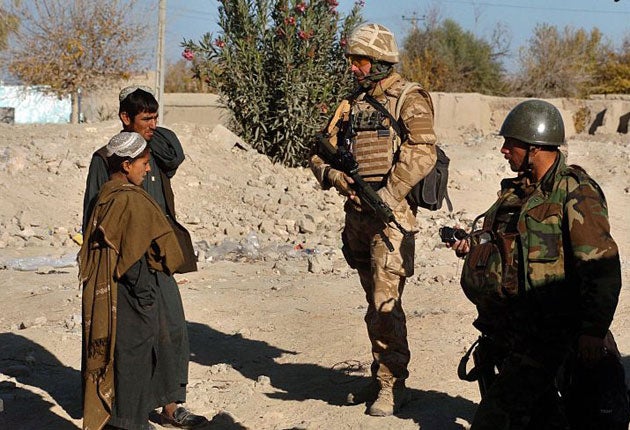British troops 'will be led by Afghans'
Despite a recent attack, the 'Afghanisation' of the war is moving to a new phase

British troops are likely to take part in operations led by Afghan commanders as part of the strategy to prepare the country's forces to take over the security of their country.
Nato forces are moving from 'mentoring' to 'partnering', with the setting up of joint headquarters in which senior Afghan officers will play a full part in drawing up plans for missions, as well as taking the lead role in some of them.
The new initiative was revealed to The Independent by a senior British commander of Nato forces in the country, two months after five British soldiers were killed by an Afghan policeman they were mentoring.
A Canadian platoon has already taken part in an operation led by Afghan forces, and its successful outcome is seen as pointing the way towards the future shape of the conflict. US President Barack Obama, Britain's Gordon Brown and other Western heads of government have stated that "Afghanisation" remains the key plank in the exit strategy from the war.
A number of major operations to clear Taliban fighters from areas of Helmand Province have been delayed while Afghan forces are made ready to take over security on reclaimed ground. British forces will train an extra 10,000 Afghan soldiers in Helmand following an agreement reached between Mr Brown and Afghan President Hamid Karzai during the UK Prime Minister's recent visit to the country.
The first joint headquarters is likely to be set up in Kandahar Province, to the east of Helmand, with General Shir Mohammed Zazai, commander of the Afghan army's 205th Corps, working alongside Major-General Nick Carter, the British commander in charge of 45,000 UK, US and other Nato forces in southern Afghanistan, the main battleground against the insurgency. Maj-Gen Carter told The Independent, "We have the technical expertise, the professionalism and the fire power. But it is also the case that we are blind in certain aspects of Afghan life. So what the Afghan forces bring provides us with a tremendous advantage.
"We shall be in a supporting role in operations with the Afghan forces, and obviously every mission would be carefully considered ... A lot will depend on the calibre of the Afghan commanders. Some have been educated abroad, some have now spent a lot of time with Nato forces and thus are familiar with the way we operate. But there are problems in some places with things like literacy among junior soldiers ... This is being addressed; we are running literacy classes which have been hugely beneficial." Maj-Gen Carter acknowledged that the killing of five British soldiers by an Afghan policeman had led to some distrust.
But he said he was "not aware" of any apprehension among British troops at being involved in possible Afghan-led operations. If there was unjustified opposition, he said, "I will stamp down on it hard, and then take those concerned to show where it is working.
"Partnering the Afghan forces is the way forward," he went on. "The politicians back home would like to see some progress being made by the spring, and I think we are on course for that. But it is not just a military matter, we need to see governance taking root as well, and it is essential that we get good district governors." He said stringent checks have been introduced in an attempt to prevent another such attack.
Join our commenting forum
Join thought-provoking conversations, follow other Independent readers and see their replies
Comments
Bookmark popover
Removed from bookmarks